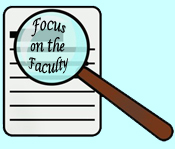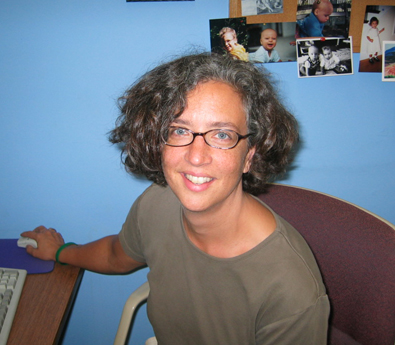Department of Political Science


Just a step in to political science professor Dr. Claire Curtis's office is a step into her world. From the pictures of and by her children (9-year-old twins Adam and Nina), to the pictures taken on her cross-country road trip, to a picture of an art piece by Edward Hopper of a lighthouse near where she went to college, to the mountains of books, all give a good visual representation of who Curtis is.
After a trip to the Soviet Union in high school, Curtis realized her interest in the political science but at the time thought that she wanted to focus on Soviet studies. A few years later, while attending Bowdoin College in Maine, Curtis made another trip overseas, this time to Poland. It was during this trip that she realized she did not want to limit her studies to the Soviet Union but wanted to concentrate on political theory.
Curtis, who is associate chair of the College's political science department, says she always knew that she wanted to be a professor. She taught at Vanderbilt University and Reed College in Portland, Ore. before coming to the College of Charleston 10 years ago. For her it was the lifestyle of a college professor that drew her to it.
"I chose to be a professor on the idea of the lifestyle it brings," Curtis says. "I get to read and learn all while having a family." She says Bowdoin College, where she recieved her undergraduate degree, is a very small college with a community feel and was the first place that sparked this desire in her.
Her passion for learning is evident the minute she starts talking about her research in post-apocalyptic literature. However, it is not the end of the world that fascinates her; it's the idea of starting over.
Her driving motivation is the idea of "What happens next?" In a society where post-apocalyptic movies are mainstream, such as "2012" and "The Day After Tomorrow," Curtis says that she wishes the movies showed how they come together after the fall out to build a new society.
She was studying the "Left Behind" series by Tim LaHaye and Jerry Jenkins based on the Christian depiction of the end of times. She has recently shifted her research because she found that the books began to get too depressing and she no longer wanted that to be what consumed her time. She is now working on a book titled "We'll Not Go Home Again: Post-apocalyptic Fiction and the Social Contract."
She excitedly explains the title with a quote from a Decembrists song and tells how the process she went through in order to get permission to use the song was exciting and how all the people she dealt with in the process were very nice.
Curtis then explains that the social contracts mentioned in the title are what happens when everything is wiped out and the survivors have to come together to start over.
The "Left Behind" series she said is a pre-modern account in that the humans can't create a new state because God does. "The problem with that is that if God creates the government, then you can't change it," she says. Most of her research now focuses on the post-modern idea that "It's not God's job." It is up to the humans to come together and figure it out.
"That's what makes class exciting, it helps continue your research if it connects," says Curtis, who is teaching two classes on her research topic, a capstone called The Idea of the Social Contract and a first year seminar class called Starting Over. An assignment for her students in the seminar class that she is particularly excited about is having them read a collection of post-apocalyptic short stories and then choose one to write the "What happens next" from where the story ends.
Curtis states that teaching a class on the subject helps her to edit and filter the material. If she comes to class and states an idea or theory that no one understands then she realizes that it may still need more work before being finalized. On the flip side, if the students do understand, it is a reassurance that her work is making sense and headed in the right direction.
She concluded talking about her research by expressing what she finds problematic about utopian view about the apocalypse using destruction as a platform. "I would like to think that we can create a better world without destroying this one,"Curtis says. And that is what she hopes to uncover in her research.
####